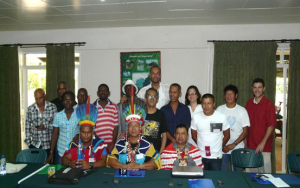NSU Newsroom
SharkBytes
Horizons
This version of NSU News has been archived as of February 28, 2019. To search through archived articles, visit nova.edu/search. To access the new version of NSU News, visit news.nova.edu.
This version of SharkBytes has been archived as of February 28, 2019. To search through archived articles, visit nova.edu/search. To access the new version of SharkBytes, visit sharkbytes.nova.edu.
NSU’s Graduate School of Humanities and Social Sciences Signs Agreement with the Republic of Suriname
FORT LAUDERDALE-DAVIE, Fla. – Nova Southeastern University’s (NSU) Graduate School of Humanities and Social Sciences (SHSS) recently announced an agreement with officials from the Republic of Suriname, to provide conflict resolution services to various stakeholders. 
Government officials, members of Indigenous and Maroon tribes, academics, members of the mining industry, and others in the South American country will receive or are already receiving conflict analysis and resolution training, as well as services to enhance capacity-building. Capacity-building will enhance and strengthen the abilities, skill-sets and behavior of those involved, increasing their ability to manage conflicts in constructive and non-violent ways.
The $77,821 Needs Assessment and Capacity Building Strategy grant from the Suriname government, will allow faculty and students from the Department of Conflict Analysis and Resolution (DCAR) at SHSS to advise, train, and develop capacity-building strategies for conflict resolution as it applies to the current multi-stakeholder processes in Suriname. The project is expected to last one year.
“I am delighted that SHSS has been able to build such a collaborative relationship with the government of Suriname” says Dean Honggang Yang, Ph.D, of the Graduate School of Humanities and Social Sciences. “Bringing conflict resolution services to those in Suriname who are involved in negotiations regarding critical issues such as land rights is essential. The most important aspect is introducing these services in a culturally respectful and non-colonial manner and empowering the Indigenous people to co-create sustainable models relevant to them.”
The foundation for this project began during the summer of 2011 when Elena Bastidas, Ph.D., faculty in DCAR and thirteen SHSS students traveled to Suriname as part of a global course developed by SHSS and taught by Bastidas. During that trip Bastidas and the students had the opportunity to deliver conflict resolution training to a group of government officials, academics and members of the civil society. Subsequently, the Suriname government expressed an interest in further training and collaboration regarding capacity building.
To date DCAR has provided two training workshops in Suriname. The first was entitled, An Introduction to Conflict Resolution and Multi-Stakeholder Processes for Governance and Sustainable Development and was designed for government officials. The second entitled Social Poligraphy as a Tool to Facilitate Maroon and Indigenous Peoples’ Processes, was developed for Indigenous peoples and Maroons of Suriname. Bastidas served as trainer along with Toran Hansen, Ph.D, another DCAR faculty member.
This project is both timely and significant as the Land Rights process is underway in Suriname with the government in negotiation with Indigenous and Maroon tribes to define the legal rights of their territories. Mining, especially gold mining also presents a challenge regarding stakeholder processes and procedures. Thus, conflict resolution training is a priority for the Suriname government, Indigenous and Maroon peoples and the mining industry.
Media Contact:
Felecia Henderson | NSU Office of Public Affairs
954-262-5315 (office) | 954-383-4695 (cell) | fhenders@nova.edu